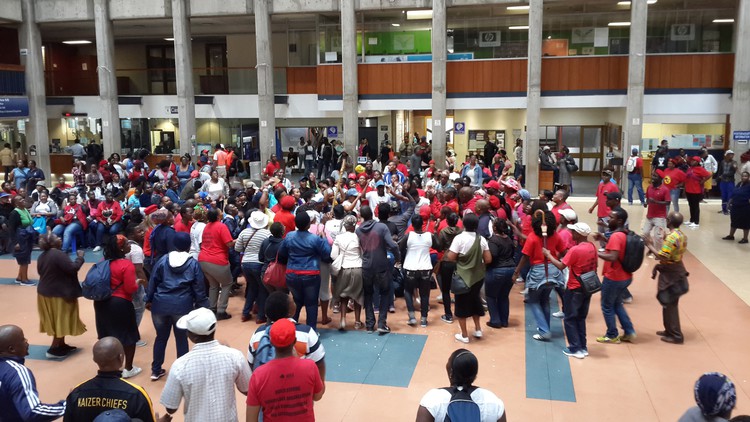
Workers at Wits University sing while waiting for the outcome of negotiations between management and union leaders. Photo: Zoë Postman
30 January 2018
Negotiations between University of Witwatersrand (Wits) management and workers’ unions took place throughout the day on Tuesday, despite talks of a near finalised agreement on Monday evening.
Unions have demanded that the lowest earning staff member earn about R10,000 per month, as opposed to R7,000. They have also demanded that the performance incentives be mediated by the unions.
National Union of Metalworkers of South Africa (NUMSA) and National Health Education & Allied Workers Union (NEHAWU) represented the workers at the meeting.
The strike started last week Tuesday when the workers demanded a 12% increase in salaries, but Wits offered 8%. An agreement had apparently been made on the weekend that workers in lower level positions would receive a 9.2% increase while the higher level positions would receive a 7.8% increase.
From about 9am, about 200 visibly frustrated workers waited in Solomon Mahlangu house for the agreement to be signed. At 4pm, the Chairperson of NEHAWU Wits branch, Paati Sam Mangena, told them to go home because the negotiations would still continue for a while.
“Please report here tomorrow morning at 8am where we will show you the finalised agreement and get your permission to sign, because without you we cannot sign that document,” said Mangena.
Mangena told GroundUp that the delay was caused by Wits refusing to commit to R124,000 per annum for the lowest earning staff member because it was a “policy issue that needed to be decided by a committee”.
The second issue was that Wits wanted to link the salary increases to workers’ performance. “They did not consult the unions on that. We [the unions] want to be involved in that process because currently the line manager has all the power to decide who gets increases or not. If the line manager doesn’t like you, you won’t get an increase,” said Mangena.
But he said he was positive that an agreement would be reached on Tuesday evening because workers wanted to return to work.
Wits Communication Officer Refilwe Mabula, said “Some University activities were disrupted (taps were opened so that bathrooms were flooded) but contingency plans have been put in place. For example, returning students who are registering this week are being assisted online.”
Mabula said first year registration continued without disruption and classes were set to start on Monday, 5 February.